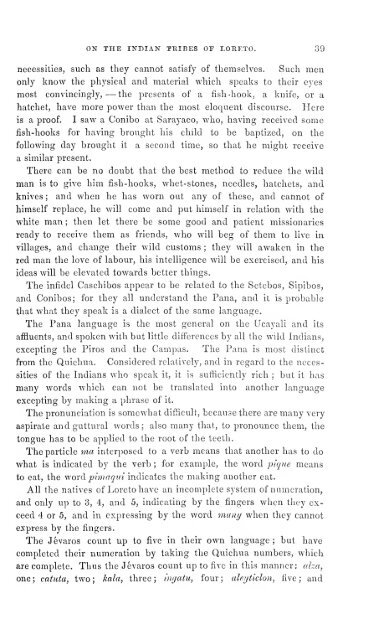The anthropological review - National Library of Scotland
The anthropological review - National Library of Scotland
The anthropological review - National Library of Scotland
Create successful ePaper yourself
Turn your PDF publications into a flip-book with our unique Google optimized e-Paper software.
ON THE INDIAN TRIBES OF LOKETO. 39<br />
necessities, such as they cannot satisfy <strong>of</strong> themselves. Such men<br />
only know the physical and material which speaks to their eyes<br />
most convincingly, — the presents <strong>of</strong> a fish-hook, a knife, or a<br />
hatchet, have more power than the most eloquent discourse. Here<br />
is a pro<strong>of</strong>. I saw a Conibo at Sarayaco, who, having received some<br />
fish-hooks for having brought his child to be baptized, on the<br />
following day brought it a second time, so that he might receive<br />
a similar present.<br />
<strong>The</strong>re can be no doubt that the best method to reduce the wild<br />
man is to give him fish-hooks, whet-stones, needles, hatchets, and<br />
knives ; and when he has worn out any <strong>of</strong> these, and cannot <strong>of</strong><br />
himself replace, he will come and put himself in relation with the<br />
white man ; then let there be some good and patient missionaries<br />
ready to receive them as friends, who will beg <strong>of</strong> them to live in<br />
villages, and change their wild customs ; they will awaken in the<br />
red man the love <strong>of</strong> labour, his intelligence will be exercised, and his<br />
ideas will be elevated towards better things.<br />
<strong>The</strong> infidel Caschibos appear to be related to the Setebos, Sipibos,<br />
and Conibos; for they all understand the Pana, and it is probable<br />
that what they speak is a dialect <strong>of</strong> the same language.<br />
<strong>The</strong> Pana language is the most general on the Ucayali and its<br />
aflluents, and spoken with but little diff"erences by all the wild Indians,<br />
excepting the Piros and the Campas. <strong>The</strong> Pana is most distinct<br />
from the Quichua. Considered relatively, and in regard to the neces-<br />
sities <strong>of</strong> the Indians who speak it, it is sufficiently rich ; but it has<br />
many words which can not be translated into another language<br />
excepting by making a phrase <strong>of</strong> it.<br />
<strong>The</strong> pronunciation is somewhat difficult, because there are many very<br />
aspirate and guttural words ; also many that, to pronounce them, the<br />
tongue has to be applied to the root <strong>of</strong> the teeth.<br />
<strong>The</strong> particle ma interposed to a verb means that another has to do<br />
what is indicated by the verb ; for example, the word pique means<br />
to eat, the word pimaqui indicates the making another eat.<br />
All the natives <strong>of</strong> Loretohave an incomplete system <strong>of</strong> numeration,<br />
and only up to 3, 4, and 5, indicating by the fingers when they ex-<br />
ceed 4 or 5, and in expressing by the word many when they cannot<br />
express by the fingers.<br />
<strong>The</strong> Jevaros count up to five in their own language; but have<br />
completed their numeration by taking the Quichua numbers, which<br />
are complete. Thus the Jevaros count up to five in this manner: alza,<br />
one ; catuta, two ; kala, three ; ingatu, four ; aleyticlon, five ; and

















